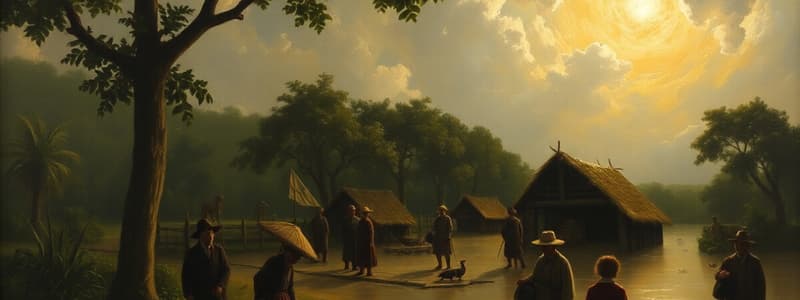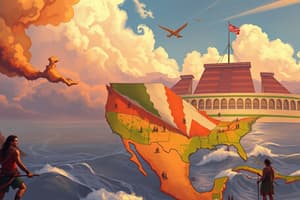Podcast
Questions and Answers
What was a significant labor system utilized by British settlers in the 17th century?
What was a significant labor system utilized by British settlers in the 17th century?
- Sharecropping
- Wage labor
- Indentured servitude (correct)
- Slavery
The New England colonies were primarily known for their agriculture.
The New England colonies were primarily known for their agriculture.
False (B)
Who was the explorer that first used the name 'New England'?
Who was the explorer that first used the name 'New England'?
John Smith
The economic theory that emphasizes the importance of exports over imports is known as __________.
The economic theory that emphasizes the importance of exports over imports is known as __________.
Match the following colonies with their primary resources or activities:
Match the following colonies with their primary resources or activities:
What was a significant effect of the Columbian Exchange?
What was a significant effect of the Columbian Exchange?
Indentured servitude was a rare form of labor in colonial America.
Indentured servitude was a rare form of labor in colonial America.
What economic theory emphasizes the importance of exports over imports?
What economic theory emphasizes the importance of exports over imports?
The New England colonies specialized in shipping, fish, and __________.
The New England colonies specialized in shipping, fish, and __________.
Match the following terms with their descriptions:
Match the following terms with their descriptions:
Flashcards
Columbian Exchange Impact
Columbian Exchange Impact
The widespread transfer of plants, animals, culture, human populations, technology, diseases, and ideas between the Americas, the Old World (Europe, Africa, and Asia), and the new world following Columbus' voyages.
Indentured Servitude
Indentured Servitude
A labor system where people paid for their passage to the New World by working for a set number of years.
Mercantilism
Mercantilism
An economic theory that emphasized the importance of maximizing a nation's wealth through trade, often by accumulating gold and silver and establishing colonies.
Salutary Neglect
Salutary Neglect
Signup and view all the flashcards
New England Colonies
New England Colonies
Signup and view all the flashcards
Columbian Exchange
Columbian Exchange
Signup and view all the flashcards
Impact of the Columbian Exchange on Europe
Impact of the Columbian Exchange on Europe
Signup and view all the flashcards
Impact of the Columbian Exchange on the Americas
Impact of the Columbian Exchange on the Americas
Signup and view all the flashcards
Study Notes
Exploration and Colonization
-
Columbian Exchange: The exchange of diseases, ideas, food, crops, and people between the New World (North and South America) and the Old World (Europe, Africa, and Asia) after Columbus' 1492 voyage.
-
Colony: A group of people leaving their home country to settle in a new land, maintaining ties with their original country. Europeans established many colonies in the Americas.
-
Examples of Colonies: New England and Chesapeake, Dutch settlements along the Hudson River, French settlements in Champlain Valley.
-
Impact of Columbian Exchange:
-
Disease: Native Americans lacked immunity to European diseases like smallpox, causing devastating effects.
-
Species Exchange: Europeans brought animals, plants, and insects to the Americas.
-
Slavery: Introduction of slavery to the Americas.
-
Trade: Food and cuisine were impacted by the exchange between Europe and America.
-
Old World/New World: Old World - Europe, Africa, and Asia; New World - Americas.
-
Motivations for Exploration (Three G's): Gold, Glory, and God.
-
Colonization: The action or process of settling among and establishing control over indigenous people of an area.
-
Roanoke: Failed English settlement in North America, with colonists mysteriously disappearing.
Jamestown
-
Establishment: The Virginia Company established Jamestown in 1607, the first permanent English settlement in the New World.
-
Challenges: Difficult location, lack of fresh water, mosquito-borne diseases, poor leadership (initial), and struggles with Native Americans.
-
John Smith: A military leader who enforced the "work or starve" rule, improving Jamestown's survival.
-
Starving Time: A harsh winter in 1609-1610, where many colonists died from hunger and disease.
-
Tobacco: John Rolfe's discovery of tobacco cultivation made Jamestown profitable, driving a boom in a tobacco plantation economy.
Bacon's Rebellion
-
Cause: Nathaniel Bacon's opposition to Colonial Governor William Berkeley's policies regarding Native Americans.
-
Outcome: Bacon's army burned Jamestown in 1676, which led to the conflicts between settlers and Native Americans.
Indentured Servitude and Slavery
-
Indentured Servitude vs. Slavery: Indentured servitude involved a contract for a set period, while slavery was permanent and people were considered property.
-
Treatment Differences: Differences in treatment affected both legal rights and social standing.
-
Servitude vs Birth: Indentured servitude's status wasn't inherited.
-
Rights Differences: Indentured servants had some rights, such as access to courts; slaves typically had significantly fewer rights.
Mercantilism and Salutary Neglect
-
Mercantilism: Economic policy aiming to maximize the wealth of a nation, limiting colonial trade to benefit the "mother country" (England).
-
Salutary Neglect: The British Crown's policy of limited enforcement of laws in the American colonies, allowing a degree of self-governance. This practice helped the development of colonial economies, but created eventual tensions regarding control.
European Interactions with Native Americans:
-
Initial Interactions: Early interactions involved a combination of curiosity, violence, and attempts at trade.
-
Consequences: Exploitation and devastating consequences like disease transmission, and displacement of indigenous populations.
-
Middle Passage: The stage of the Atlantic slave trade where Africans were transported to the Americas.
-
New England Colonies: Characterized by rocky coastline, good harbors, dense forests, and mountainous terrain. Shipping, fishing, and timber were key economic activities.
-
Middle Colonies: Built on farming, milling, lumbering, shipbuilding. Industries related to forest resources were also important.
-
Southern Colonies: Known for warm weather, plantation agriculture, and bustling coastal cities. Characterized by a robust economic region.
Studying That Suits You
Use AI to generate personalized quizzes and flashcards to suit your learning preferences.




